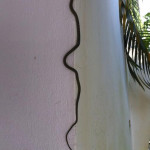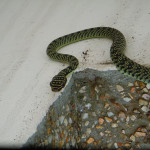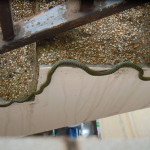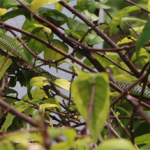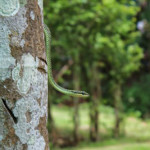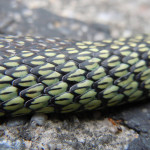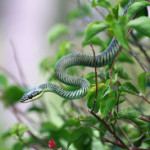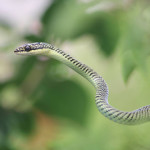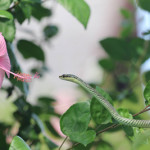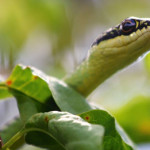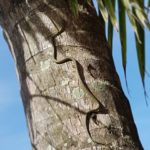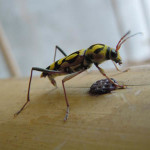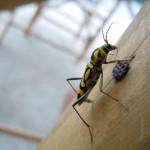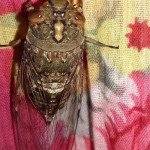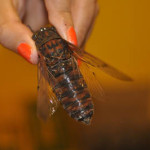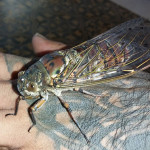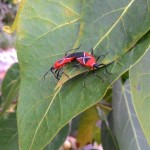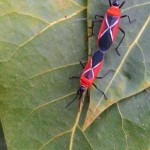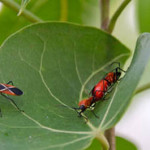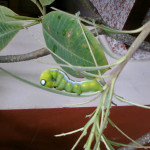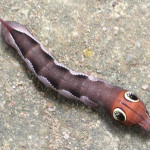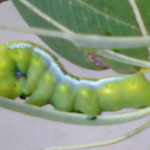Golden Tree Snake (Chrysopelea ornata)
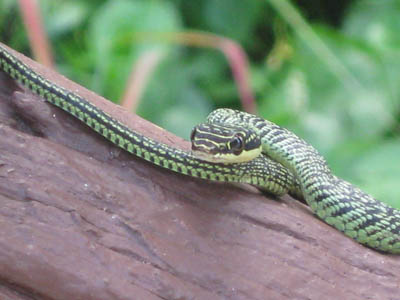
Image Copyright Lindsay Seggie
Observed: November 2018
Observed By: Lindsay Seggie, Tijl Adriaen, Laszlo Halsz, Perry Stevens, Robert Poser
The Golden Tree Snake isn’t golden. Who names these animals? Instead it has a characteristic black and green mottled colouration. In fact in certain other habitats it apparently has some orange markings as well – but not here on Koh Chang where it is one of the most commonly sighted snakes.
Oh, and it can fly! Well that’s not strictly true but it able to leap from trees and glide in a controlled fashion. That would be a thing to see. They flatten their bodies when gliding and form a U-shape on their underside which traps air and acts as a parachute.
The snake isn’t particularly large with a maximum lenth of 130 centimetres. And yes, it is poisonous, but only very mildly, and they are not considered a danger to humans.
Golden Tree Snake Wikipedia
Image Copyright Lyle Martinez
Image Copyright Tijl Adriaen
Image Copyright Tijl Adriaen
Image Copyrigh Perry Stevens
Image Copyright Perry Stevens
Image Copyright Tijl Adriaen
Image Copyright Laszlo Halasz
Image Copyright Laszlo Halasz
Image Copyright Laszlo Halasz
Image Copyright Laszlo Halasz
Flat-Tailed House Gecko(Hemidactylus platyurus)
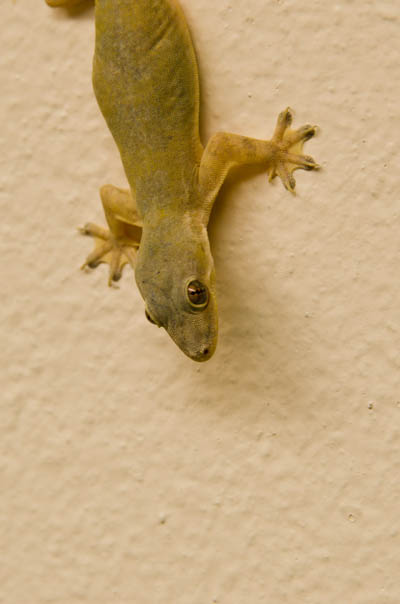
Last Observed: February 2015
Observed By: David Vinot
This small lizard is a member of the gecko family that is know in Thai as a Chingchok. It is the smaller cousin of the Tokay Gecko.
It is probably the most common and widespread lizard in Thailand and wherever you are if you look around the walls and ceiling of the building you are in you will probably see several. They are voracious insect hunters and are extremely useful for getting rid of mosquitoes and other biting insects.
Flat-Tailed House Gecko Wikipedia
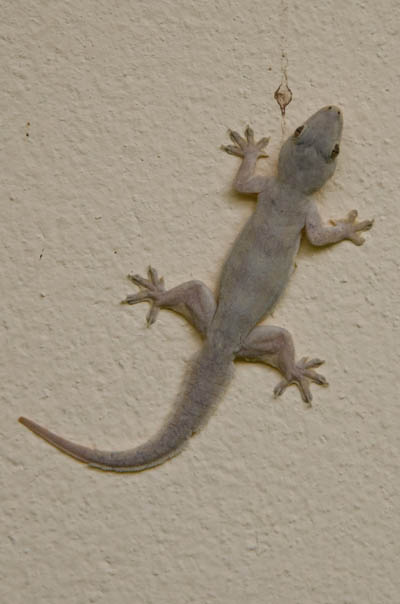
Mountain Horned Dragon (Canthosaura armata)
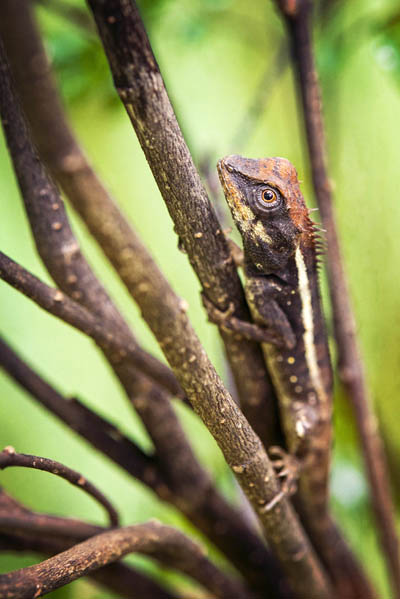
Image Copyright Jonathan Milnes
Last Observed: November 2015
Observed By: Jonathan Milnes
Mountain Horned Dragons, also known as Pricklenape Agamas are a species of lizard with a characteristic set of spikes at the neck.
They are well suited to Koh Chang, preferring a hilly and forested habitat. They live exclusively on insects and consume only live prey.
Acanthosaura Wikipedia
Bowring’s Supple Skink (Lygosoma bowringii)
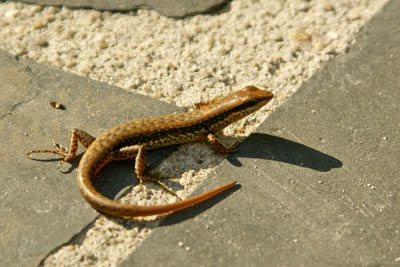
Image David Vinot
Last Observed: November 2015
Observed By: Tijl Adriaen, David Vinot
Also known as the Christmas Island Grass Skink, Bowring’s Supple Skink is a reptile found in East and Southeast Asia, Australian and the Philippines.
Bowring’s Supple Skink Wikipedia
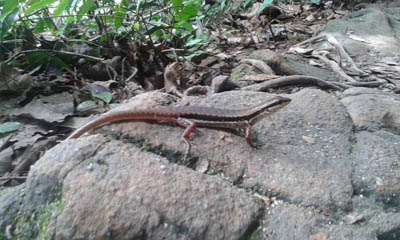
Image Copyright Tijl Adriaen
Bamboo Loghorn Beetle (Chlorophous Annularis)
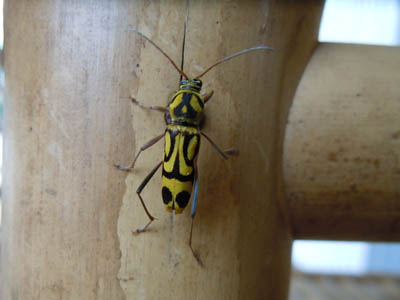
Image Copyright Tijl Adriaen
Last Observed: November 2015
Observed By: Tijl Adriaen
Chlorophorus annularis, a.k.a. the Bamboo Longhorn Beetle, is a species of beetle in the family Cerambycidae. It has an elaborate yellow and black patterned shell.
Image Copyright Tijl Adriaen
Image Copyright Tijl Adriaen
Cicada (Platylomia radha)
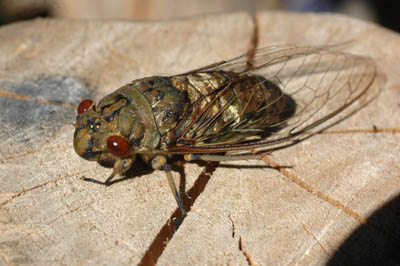
Image Copyright David Newman
Last Observed: December 2015
Observed By: David Newman, Jean-Piere Odet, Supotch White
Cicadas are a widespread insect species that are most common in the tropics. You will seldom see them but if you’re anywhere near one, especially around sunset, you’ll know.
They make a high pitched, screeching sound that can be most disconcerting. They do this using a specially developed exoskeletal structure called a tymbal which they vibrate rapidly with cacaphonic results.
If they fly into your room you can easily pick them up by gently pinching together their wings and set them, and your ears, free.
Platyloma Wikipedia
Image Copyright Jean-Pierre Odet
Image Copyright David Newman
Image Copyright Supotch White
Cotton stainers (dysdercus suturellus)
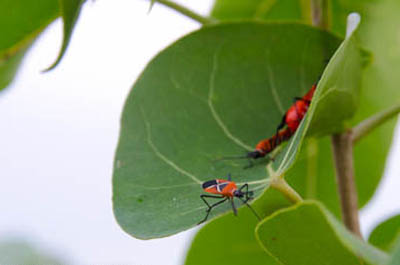
Image Copyright David Vinot
Last Observed: February 2015
Observed By: David Vinot
The Cotton Stainer is a small insect that comes from the family Pyrrhocoridae. They are charectirised by simple but striking shell markings in a similar fashion to the man-faced shield bug.
Pyrrhocoridae Wikipedia
Image Copyright Teerasak Thomas Suamcheepmasau
Image Copyright Teerasak Thomas Suamcheepmasau
Image Copyright David Vinot
Oleander Hawk Moth (Daphnis nerii)
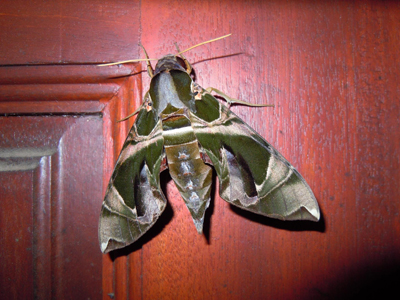
Image Copyright Tijl Adriaen
Last Observed: November 2015
Observed By: Tijl Adriaen, Dave Hinchliffe
The Oleander Hawk Moth is striking as a caterpillar and has a beautiful adult form as well.
The caterpillar has very large false eye colours to mislead predators.
The moth feeds largely on the highly toxic oleander plant, to which it is immune. When it can’t feed Oleander it thrives on plants from a family called Dogbane, you’d have to assume they were toxic too.
Daphnis Nerii Wikipedia
Image Copyright Dave Hinchliffe
Image Copyright Dave Hinchliffe
Image Copyright Dave Hinchliffe
Dasychira Horsfieldi
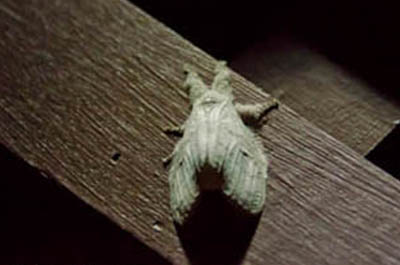
Image Copyright David Vinot
Last Observed: February 2015
Observed By: David Vinot
Dasychira Horsfieldi is a small moth named after a chap called Horsfield. And that’s about all we can tell you.
Handmaiden Moth(Syntomoides imaon)
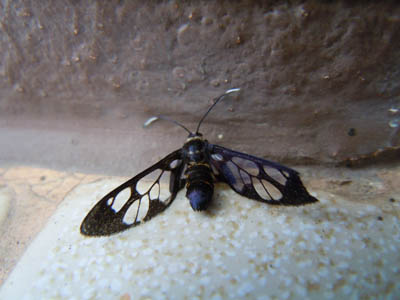
Image Copyright Tijl Adriaen
Last Observed: November 2015, Koh Chang
Observed By: Tijl Adiaen
The Handmaiden moth is a small but striking insect with two yellow bands on a black body. It is the wings, however that are the moth’s most arresting feature. On afirst glance they apear to be full of holes but this is because the clear wing sections are covered by a hyaline patch.
Handmaiden Moth Wikipedia


